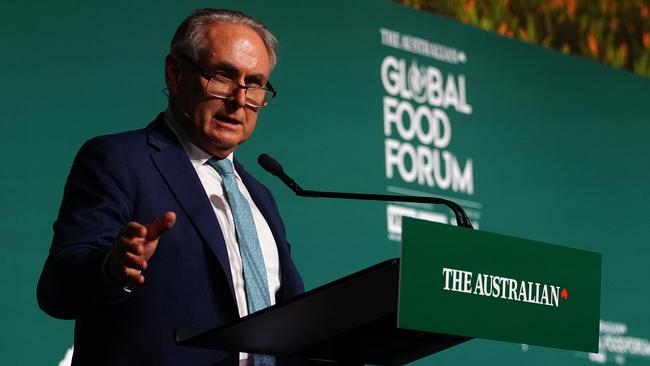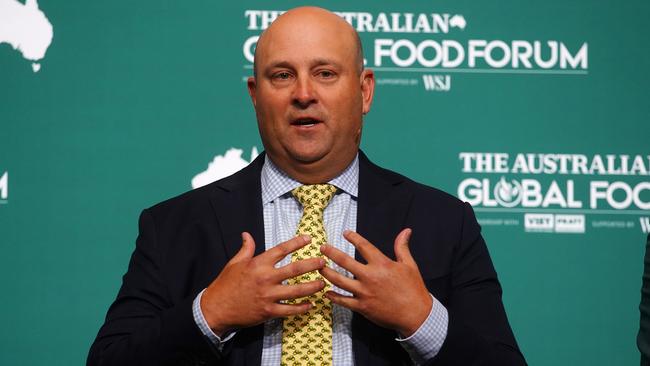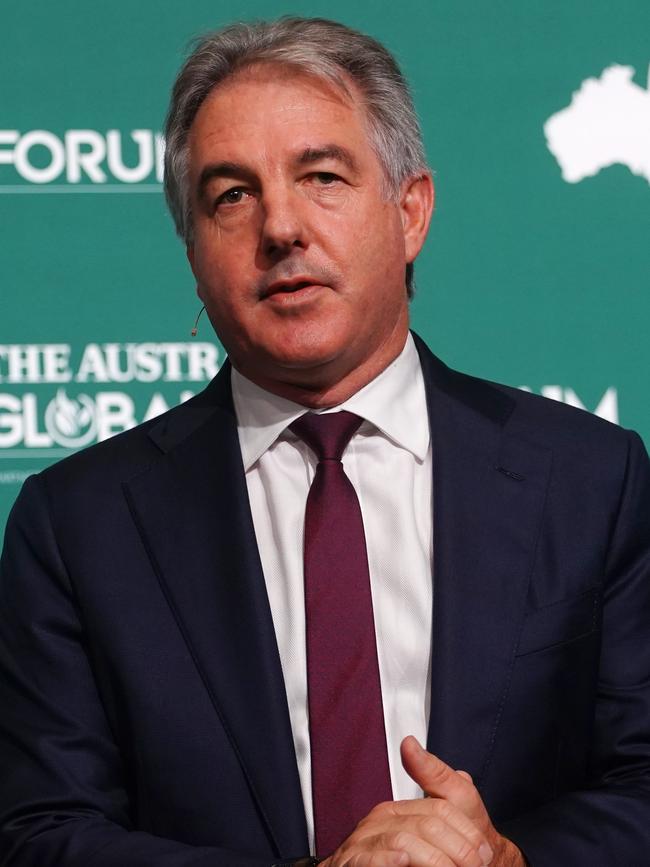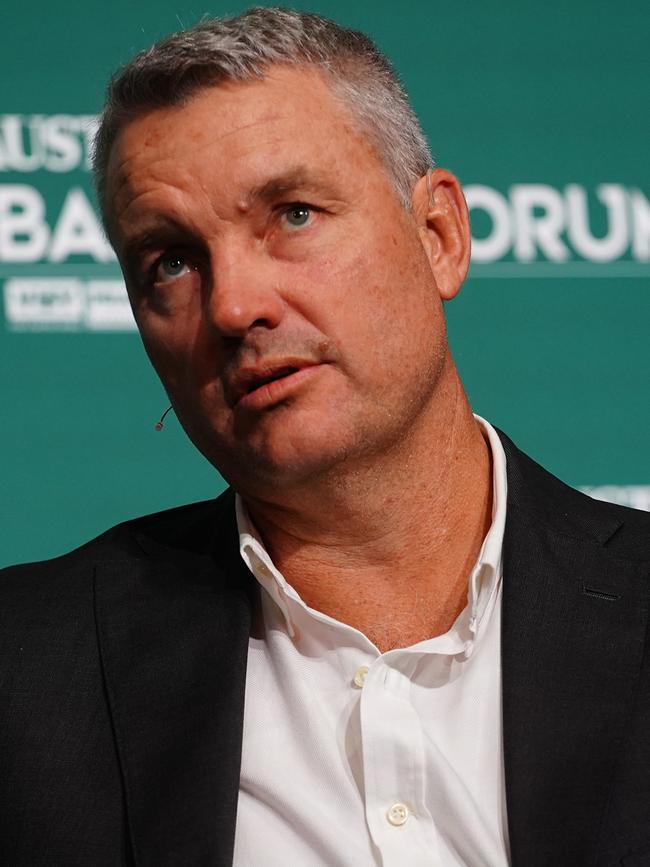WTO challenge an ‘option’ on Donald Trump’s tariffs
The move is being considered as the nation’s $150bn food and agriculture industry raises fears that wider tariffs will further damage the global economy.

Australia is considering a World Trade Organisation challenge against US President Donald Trump’s steel and aluminium tariffs, as the nation’s $150bn food and agriculture industry raised fears a new wave of food and pharmaceutical tariffs will further damage the global economy.
With Canada filing a formal dispute complaint to the WTO overnight over its punitive tariffs treatment, a senior government source told The Australian: “Australia is considering its options. Australia is a strong supporter of the WTO and the rules based order.”
Mr Trump’s trade war threatens to further destabilise the WTO and the revelation that Australia may consider a dispute consultation with the body underscores concern the tariff spat may escalate into a global crisis.
Trade Minister Don Farrell said he was “deeply concerned” over the prospect of a new wave of food and pharmaceutical tariffs hitting Australian exporters on April 2, but vowed not to respond with retaliatory tariffs on the US.
Asked if he was seeking an exemption from reciprocal tariffs, Senator Farrell said he was seeking “the application of our fair trade agreements” with the US. That entailed Australia not imposing tariffs on them “and they don’t charge tariffs on us”.
Anthony Albanese made his own move on Friday, ramping up taxpayer protection of the nation’s steel and aluminium industries in response to Mr Trump’s 25 per cent tariffs, announcing $750m worth of subsidies to keep producers globally competitive.
Top business leaders told The Australian and Visy’s 2025 Global Food Forum they were increasingly worried about an economic bombshell from the unravelling trade situation.
Farming equipment maker John Deere said it was on watch over the threat of more imposts which may land in April.
“From a macro point of view, the idea that we’re putting more cost and price into the economy is only going to drive some of this inflationary pressure,” John Deere Australia & New Zealand managing director Luke Chandler told the forum.
“We’ve obviously as a global economy just worked through a high inflation period and central banks have only just started unwinding some of that pressure. If we go back into higher inflation, that will certain raise some broader concerns around recession.”

Agriculture giant GrainCorp said it was also concerned over the outlook.
“I think the real risk with tariffs is that it lifts costs for consumers and that drives inflation and that’s not good for anybody,” chief executive Robert Spurway said. “What we’ve seen in the past when tariff regimes come in is it just disrupts and dislocates the most efficient global supply chains and brings inflation.”
Senator Farrell spoke with US Secretary of Commerce Howard Lutnick on Friday morning when he conveyed Australia’s disappointment on failing to win an exemption on steel and aluminium exports while also discussing the threat of additional tariffs from April 2.
“Deeply concerned because if you take what has been said by President Trump and the Americans, they are now looking at this reciprocal tariff arrangement,” Senator Farrell told the forum.
A further call with US Trade Representative Jamieson Greer is scheduled on Tuesday Australian time.
“Will it be successful? Well the point has been made Trump mark two is not the same as Trump mark one. So it’s a more difficult conversation,” Senator Farrell said.
The Prime Minister reiterated that the tariffs hit was an “act of economic self-harm” on the part of the US, and “we do not regard this as the act of a friend”. “We will stick to the agreement that is there, the Australia-US FTA, that we think is in Australia’s interest,” Mr Albanese said.
Australia’s biggest beef producer AACo said the move by Mr Trump had created questions among its US workers.
“There is some definitely some hesitation and some questions being asked there, particularly by our employees in the US. Certainly those US employees are concerned about what it does mean,” AACo chief executive David Harris said. “It could be a China thing again.”
Australian rice grower Sun-Rice said the lack of carve-outs made it a different trade skirmish to previous spats over the years.
“I think what is new is the unilateral way in which tariffs look like they’re going to be applied,” chief executive Paul Serra said. “And that will have a fairly immediate effect in terms of inflation and flow on effects globally.”
The Australian agricultural sector is facing challenges on many fronts, including trade wars, foreign investment and long-term shifts in sentiment.
e61 Institute chief executive Michael Brennan told the forum that “Australia does well in a rules-based order, it doesn’t do well in an economic arm wrestle”.
“We’re a middling producer but a big exporter, which creates vulnerability when channels are compromised,” he said.
“There’s been a long-term secular shift in terms of (there being) more corporate and more international investment.”
Former Labor minister Bill Shorten said on Friday that Australia should “reciprocate dollar for dollar” if Mr Trump keeps slapping trade tariffs on Australian goods, declaring that the nation “cannot be pushed around”.


However, Senator Farrell said it was not the favoured approach.
“Some people have said, ‘Let’s retaliate against the United States, let’s start proposing tariffs now’,” he told the forum.
“As tempting as that might be … I don’t think it’s the way to resolve these outstanding issues. And I think a sensible collective approach, the way that we connected with China, is the way we need to deal with these issues. And certainly that’s the policy to adopt.”
US Studies Centre senior economics adviser John Kunkel told the forum: “Bill Shorten is a good guy, but retaliatory tariffs are a Dumb and Dumber strategy.
“The government is absolutely right and Bill is absolutely wrong.”
Australian Centre for International Trade and Investment founder Prudence Gordon said: “I’m hugely concerned, we’re in an unprecedented place when it comes to tariffs.”
Mr Kunkel said Australia’s bureaucracy needed to increase its muscle mass around the new world order of trade wars.
That included retitling the Albanese government’s ambitious Future Made in Australia manufacturing program to reflect the change in the world economy, meaning trade and supply chain security.
“We need to redesign Made in Australia with a national security lens. It’s been overweight net-zero and underweight national security,” Mr Kunkel, chief of staff to former prime minister Scott Morrison, told the forum.
Meanwhile, Coles boss Leah Weckert said she had noticed moderating inflation into 2025, with some fresh produce such as apples and pears actually in deflation, but consumers were still operating with a “frugal” mindset given the inflation shock of the past two years and it could them take 12 to 18 months to change their behaviour.
She said prices had moderated since their peaks of about 7-8 per cent in 2023 with inflation at Coles in the first half of 2025 down to about 1 per cent, adding that if fresh produce was excluded the inflation rate would have been 0.1 per cent.
“So from a customer perspective it is very pleasing that they are going into stores and they are finding things that are actually cheaper than before,” she said.
It would take time, however, for consumers to change their shopping behaviour having worn the scars of high inflation for some time.
“But I do think it will take 12 to 18 months before we see some of the behaviours from consumers unwind, as there is still so much cautiousness about the financial health of their households,” Ms Weckert said.
“I think it’s going to take a little bit more time and probably a little bit more of the evidence for that viewpoint to really start to be evident.”
Additional reporting: Eric Johnston, Eli Greenblat



To join the conversation, please log in. Don't have an account? Register
Join the conversation, you are commenting as Logout